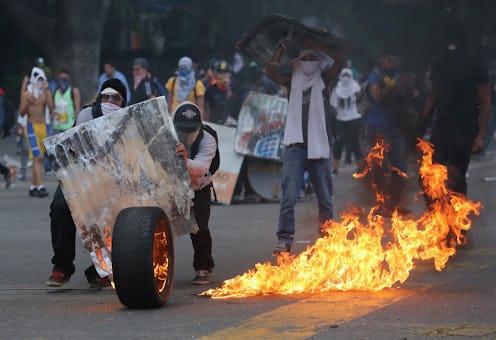News
A Guide To What's Going On In Venezuela
As the world focuses on Ukraine, Vice President Joe Biden warned that the growing protests in Venezuela, which have claimed 20 lives in the last month, have resulted in an “alarming” situation on the other side of the world. Biden compared President Nicolas Maduro to the dictators of South America’s Cold War past, and accused him of violating the “universal human rights” of his countrymen. The Vice President also denied Maduro’s claims that the U.S. government is supporting anti-government protesters.
"The situation in Venezuela is alarming,” Biden said in an interview with a Chilean newspaper on Sunday. “[It] reminds me of previous eras, when strongmen governed through violence and oppression; and human rights, hyperinflation, scarcity, and grinding poverty wrought havoc on the people of the hemisphere.”
Confused about what’s going on? Here’s a refresher.
Protests Get Violent
In mid-February, anti-government demonstrators took to Venezuelan streets to protest chronic food shortages, high inflation and a general lack of access to basic goods. The demonstrations quickly turned violent when government security forces responded to a student protest by deploying tear gas and arresting students. Later, al-Jazeera reported that National Guard troops and pro-government militias “swarmed the streets of Caracas and other cities firing weapons, at times indiscriminately, in repeated spasms of nighttime violence.” Multiple videos depict government forces assaulting protesters.
Both sides have accused one another of instigating the violence, though, and as usually the case in these situations, it’s frustratingly difficult to distinguist accurate reporting from propaganda. A couple of days ago, a National Guardsman was killed in a protest, and anti-government protesters have been accused of decapitating motorcyclists by setting up razor wire on roadways. In any event, at least 21 people have lost their lives so far; victims include a former beauty queen, a former world champion boxer, multiple students and the brother of a ruling Socialist Party member.
MADURO BLAMES U.S.
In an interview earlier this week, Maduro defended the government’s response, saying that his administration has reacted exactly the way the U.S. would if the shoe was on the other foot.
"What would happen in the United States if a group said they were going to start something in the United States so that President Obama leaves, resigns, to change the constitutional government of the United States?" Maduro said. "Surely, the state would react, would use all the force that the law gives it to re-establish order and to put those who are against the Constitution where they belong."
Maduro has accused the U.S. of instigating and funding the protesters, but there’s no evidence yet that the U.S. has directly supported the current wave or protests.
However, this claims isn’t particularly implausible. The U.S. is no fan of the Maduro government, just as it was no fan of his predecessor’s government, and the current U.S. budget allocates $5 million to “competition-building efforts that will protect democratic space” in Venezuela. In addition, the U.S. has a long, well-documented history of overthrowing democratically elected leaders in South America. As recently as 2002, the U.S supported a coup attempt against then-President Hugo Chavez.
While this doesn’t mean the U.S. is always behind every instance of domestic unrest in the region, it does suggest that Maduro’s claims are, at the very least, based in historical precedent.
THE FACE OF THE OPPOSITION
The protesters don’t represent one particular political affiliation. Maduro and progressive groups in the U.S. have accused the protesters of being far-right and/or fascists, but that’s only partially correct. The early leader of the opposition movement, Leopoldo Lopez Mendoza, is often referred to as far-right in his political leanings. In 2002, perhaps with support from Bush administration, he helped orchestrate an unsuccessful coup against Chavez, and was subsequently banned from running for office in the country. After this year’s protests started heating up, a warrant was issued for his arrest, and now he’s in jail.
That being said, the protesters are a diverse group. Some are far-right nationalists, but some are not. Other leaders have filled the void left by Lopez, particularly Henrique Capriles, a former governor who ran against Maduro for president in 2013. Capriles, who unsuccessfully contested the results of last year’s election, used to be of conservative political leanings but has since moved to the middle, and has urged a more peaceful approach than Lopez.
WHAT HAPPENS NEXT
On Saturday, the Organization of American States (OAS), which is comprised of representatives from every country in the Western hemisphere, voted to support the Maduro administration’s response to the protests. Only the U.S., Canada and Panama objected, and Maduro presented the vote as a diplomatic win for his administration. However, it’s unclear what response, if any, the vote will prompt from the U.S.
